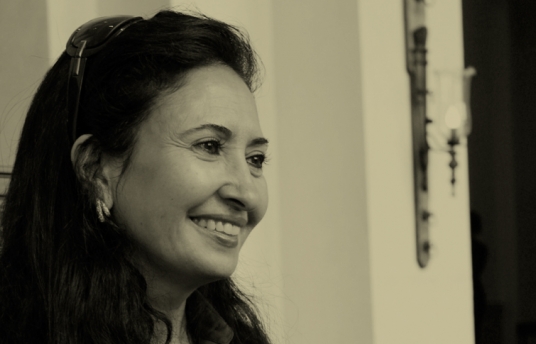People in Film: Khadija Al Salami
May 07, 2013

DFI: How did you discover filmmaking?
Khadija Al Salami: I started working at a television station in Yemen when I was 11 years old, mainly focusing on children’s programmes. When I graduated high school, I was good at math and science, but when I went to the United States and received a scholarship, I became more attracted to communications, television, film and other visual mediums. Most of my films are feature length, the shortest being 30 minutes. I find that I am always attracted to social problems and the continual struggle for equality among women. I cannot do something I do not feel passionate about. I have one film which is about a young girl who is attacked because she plays in the streets and refuses to stay home. I made ‘A Stranger in Her Own City’ by sheer coincidence as I spotted a girl and ended up following her. I deal with diverse themes within my filmmaking, from women’s struggle for democracy to archeology and architecture.
DFI: You mention that you explore a lot of social issues. What has been the most difficult or sensitive project you have undertaken?
KS: ‘Amina’ was a difficult film to create as it was shot inside a jail and I worked primarily with inmates convicted of murder. I spent one night and more than 10 days inside the walls of the prison filming and looking for captivating stories. Then I discovered a young woman who was accused of killing her husband. I just wanted to capture her side of the story – I didn’t want to defend her. However, when I found out that she couldn’t be the person who killed her husband, I did my best to defend her, helped have the death sentence waived and freed her from prison. Maybe it is a bad thing that I get so attached to my characters, they become like part of my family. I did this film seven years ago and to this day I still help that woman and her son.
DFI: You are currently working on a feature film; can you tell me more about this upcoming project?
KS: ‘I am Nojoom’ is a feature inspired by my own personal experience, which is something shared by other girls who have had to face early marriage. I would love to shoot this project in Yemen; the problem is security in the area. But others have advised me to go and shoot in Morocco, but will see how the project develops and hopefully we will discover a suitable landscape in which to shoot. I am also currently working on a documentary called ‘Killing Me Is a Ticket to Paradise’.
DFI: What challenges do you face in funding your projects and bringing them to audiences?
KS: Before when I had work, I funded all my own projects and did everything myself. So the main difficulty I have is trying to do everything. It is not easy because you have to concentrate on so many details across an entire project. I rely primarily on a guerrilla style of filmmaking; I don’t prepare, I just go into action because sometimes the mind wanders. I don’t give myself the time to sit, interview and plan – I film and create things as they are happening in a given moment. I think it’s my unique style of filmmaking that allows my work to be screened on a number of regional and international television stations.
DFI: Do you normally create documentaries for television channels?
KS: I really make these films for myself. But then they are promoted and picked up by television networks and festivals. The film then becomes something living that I give to audiences. The last film I made first premiered in Dubai. It was so well received by audiences that I started to get requests from all over the world. I’m glad that people are interested in my work, whether they love or hate it doesn’t matter to me – the true gauge of success is if people react to the images on the screen.